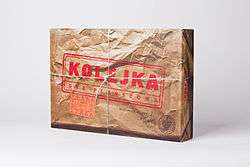Kolejka (game)
|
Game box | |
| Designer(s) | Karol Madaj |
|---|---|
| Illustrator(s) | Natalia Baranowska, Marta Malesińska |
| Publisher(s) | Institute of National Remembrance |
| Publication date | 2011 |
| Genre(s) | board game |
| Language(s) | Polish, English, German, Spanish, Japanese, French, Romanian, Russian |
| Players | 2–5 |
| Age range | 12 and up |
| Playing time | 60 minutes |
Kolejka ([kɔˈlɛi̯ka]; Polish for "queue" or "line-up") is a board game designed by Karol Madaj[1] and launched in February 2011 by Poland's Institute of National Remembrance.[1] Created by Karol Madaj, it was designed to teach young generations about the hardships under communism (1945–1989), particularly the difficulty of acquiring consumer goods in the shortage economy.[2][3] The game has been described as inspired by Monopoly.[1]
An international version of the board game, which includes manuals and translation stickers in Polish, English, German, Spanish, Japanese and Russian, was released in 2012.[4][5][3] A French edition was added in 2013,[6][7] and a Romanian version called "Stai la coadă" (Stand in line) was released later that year, on November 26.[8]
An expansion, "Ogonek" (Polish for "curved end of the queue", lit. "tail"), adding another player and a number of additional cards and supplementary educational materials, was also released.[3]
It is one of several educational and historical games released by the Poland's Institute of National Remembrance.[1]
By July 2012 the game has sold 20,000 copies of the Polish edition within a year and has been described as best selling.[9] By June 2014 the total production run of the game was almost 100,000 copies.[10] It has also proven popular abroad. In the summer of 2014 IPN sold the game's license to a private company (Trefl[11]), citing its inability to efficiently manage the game's production, demand for which regularly exceeded IPN's production budget, and led –– ironically, as numerous sources described – to numerous shortages in the game's availability.[12][13][10][14]
Educational value
In keeping with its educational goal, the cards illustrate historical goods of the era in which they were sold, and the game is accompanied by an historical brochure explaining the economic realities of the shortage economy in communist Poland.[3] The first Polish edition was also distributed with a documentary film.[2] Historical accuracy of the game was supervised by Polish historians Małgorzata Mazurek[15] and Andrzej Zawistowski.[16]
Karol Madaj, the game's creator, described the game's goal as "We want to show young people and remind the older ones what hard times these were and what mechanisms were at play".[2]
Game play
The game is played by 2 to 5 players, each controlling five pawns, representing their family members. Each family needs to do some shopping for events such as birthdays or holidays or such, however each player faces the problem of a shortage of needed goods. The stores are mostly empty, and there is no certainty as to what will be delivered or when and where it will be delivered. The players have to decide which store to queue in front of, and can play various event cards such as "This isn't your place", "Colleague in the government", or "Store closed", changing the order of the pawns in the queue (which represents jumping the queue, or forcing other players out of it). Goods can also be exchanged on the bazaar (black market). The first player to collect the required set of goods cards is the winner.[3][1]
Reception
The game has received good reviews, both for its game play and its educational value.[3] It has been used in history classes.[6]
The game received the 2012 "Gra Roku" (Game of the Year) Polish board gaming award, becoming the first Polish board game to receive this particular award.[17]
See also
- Line stander (stacz kolejkowy)
References
- 1 2 3 4 5 Petzinger, Jill (2011-01-20). "'Communist Monopoly' Teaches Downside of Socialist Life". Spiegel Online.
- 1 2 3 "Polish board game recalls communist hardship". Associated Press (FOX News). 2011-01-25. Archived from the original on 2011-06-01.
- 1 2 3 4 5 6 "Kolejka - światowy sukces gry edukacyjnej z IPN". fronda.pl.
- ↑ "Polish game on communist hardships goes global". Associated Press (Google News). 2012-06-28. Archived from the original on 2012-06-29.
- ↑ "Premiere of the international edition of "Queue" ("Kolejka") - Polish most renowned historical game - Warsaw, 28 June 2012". Institute of National Remembrance. Retrieved 2012-06-29.
- 1 2 RedOctober (17 June 2013). "Wielki sukces IPN-u, sprzedają swój produkt nawet w Japonii i Nowej Zelandii". Onet Gry.
- ↑ ""Kolejka" hitem eksportowym". dziennikpolski24.pl.
- ↑ Hașu, Ioana (2013-11-27). "„Stai la coadă“ - un fel de Monopoly despre comunism". RFI România. Archived from the original on July 18, 2014.
- ↑ "Europe – Poland's communist 'monopoly' board game goes global". France 24.
- 1 2 DARTH (25 June 2014). "IPN sprzedaje licencję na hitową grę „Kolejka”". tvp.info.
- ↑ http://ipn.gov.pl/__data/assets/pdf_file/0014/131360/informacja-wynik-postepowania.pdf
- ↑ Karol Madaj. "IPN sprzedaje licencję na „Kolejkę”". GamesFanatic.pl.
- ↑ "IPN sprzeda licencję na popularną grę planszową „Kolejka”". dzieje.pl.
- ↑ Daniel Michaels (2 May 2013). "Poles Apart: Today's Kids Line Up to Learn About Communist Past in Poland". WSJ.
- ↑ "Kolejka spod lady IPN-u". PolskieRadio.pl.
- ↑ "Instytut Pamięci Narodowej". ipn.gov.pl.
- ↑ "Gra Kolejka z IPN Grą Roku 2012". dziennikzachodni.pl.
External links
| Wikimedia Commons has media related to Kolejka (board game). |
- Official news release on IPN pages, 2011 (in English)
- Print-and-play version official page
- Kolejka at BoardGameGeek
